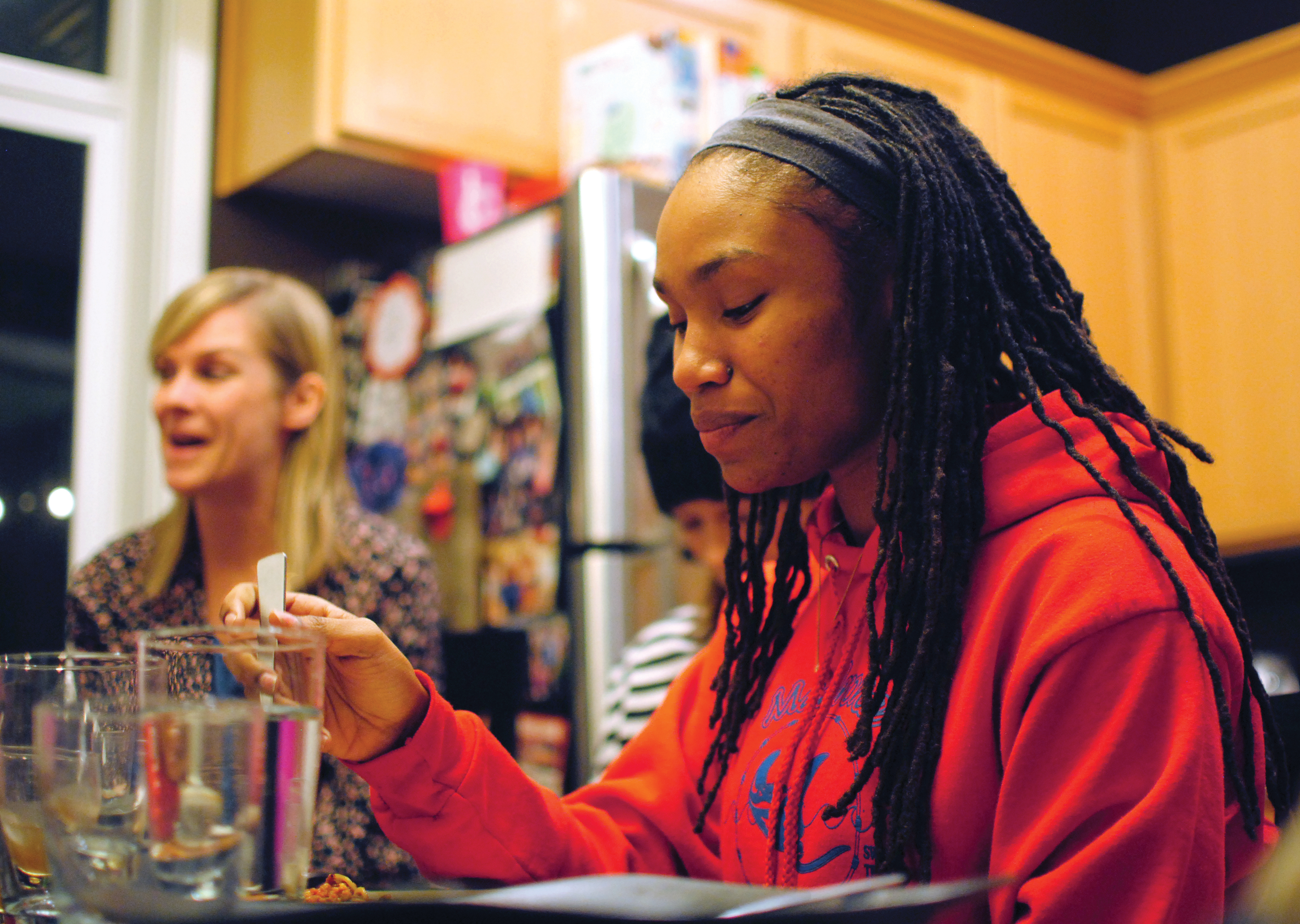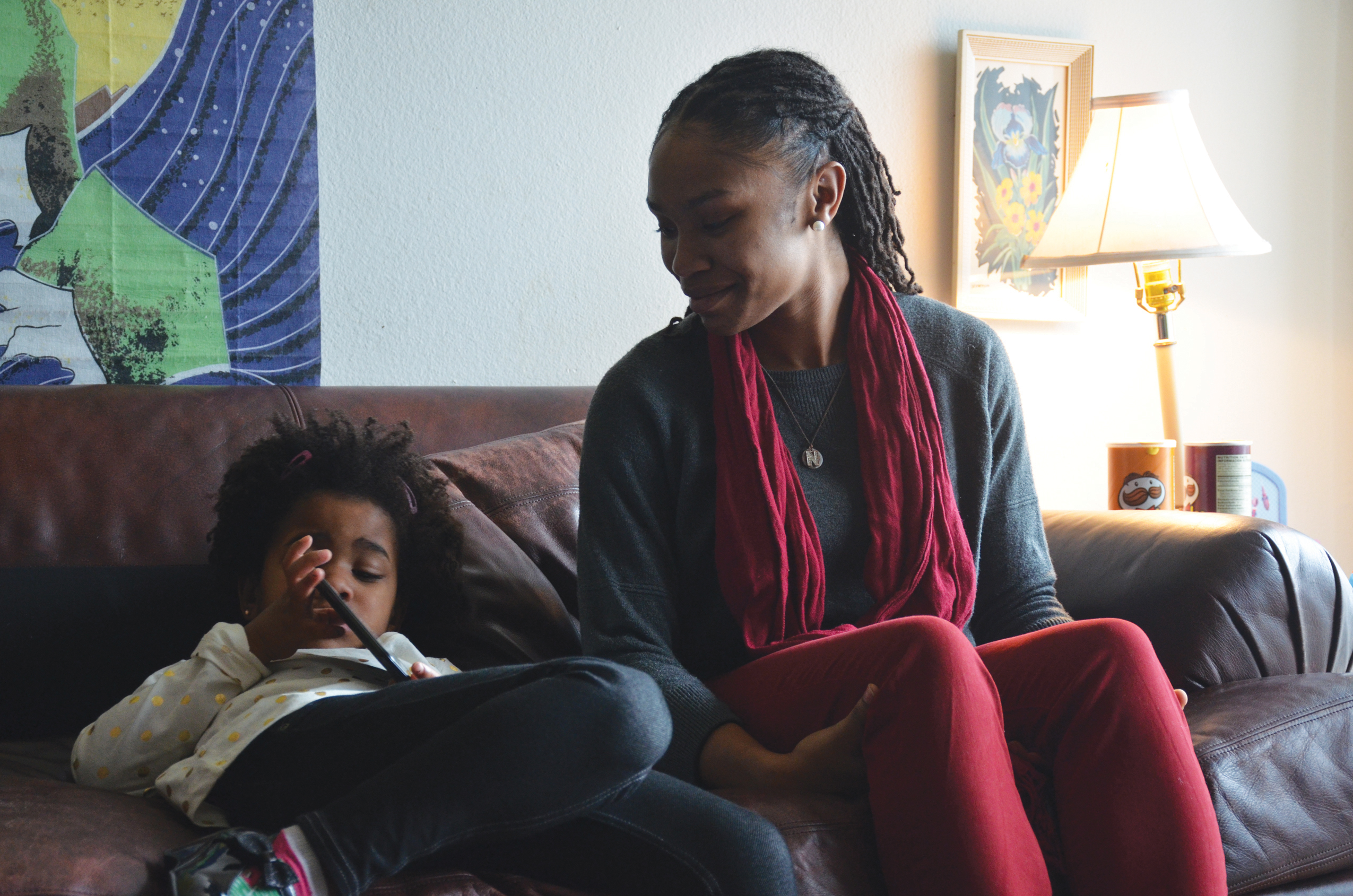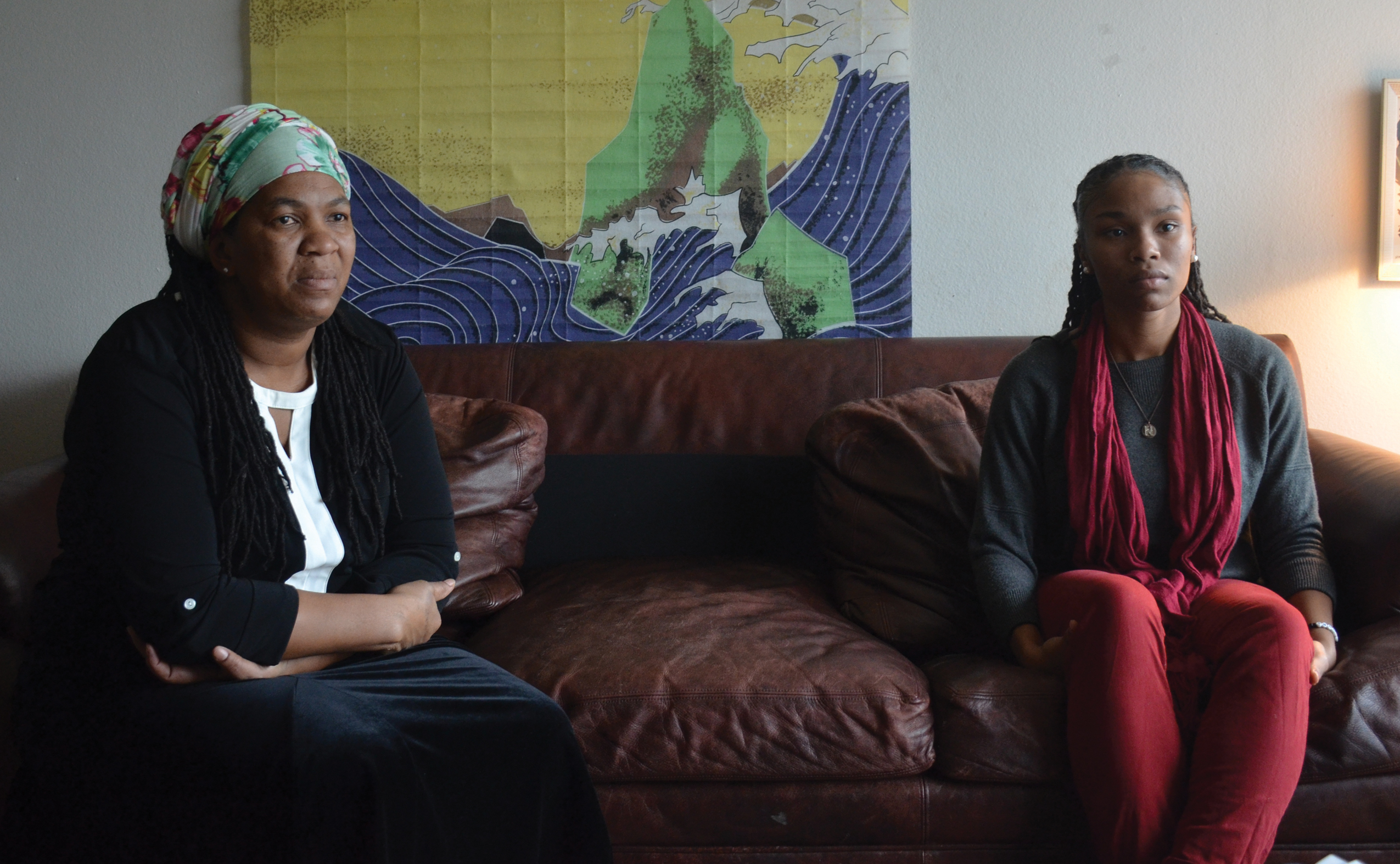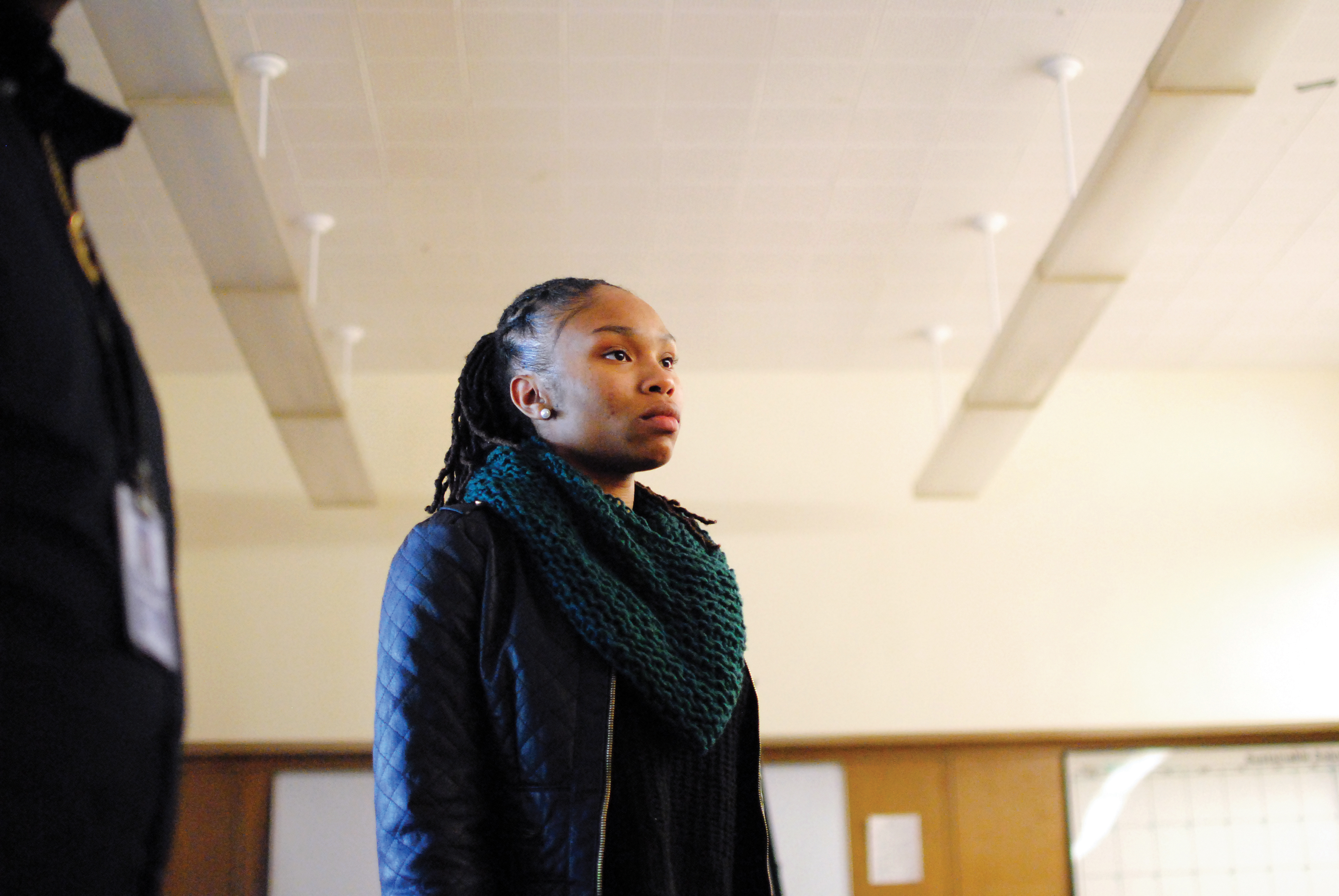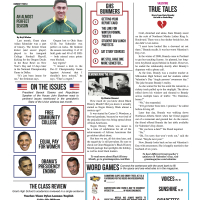Three years ago, Shayla Noil’s mother packed her family into their Chevrolet Suburban and left New Orleans for good. All they had was food and two bags of clothes.
As they drove away, Noil, then 14, thought this would be like the other times they had left their home to escape domestic abuse from her father. She was sure they would be back.
Soon, she realized they weren’t returning. This was for good.
They spent a month in Tennessee with family, but her mother feared that if they stayed there for too long the father would find them. They drove for eight days straight to Portland, where Shayla’s older brother, Shelby Ratliff, was living. Without money to stop for hotels, Noil and her family slept on the side of the road in the car.
Back then, Noil didn’t know anything about Portland. She only knew it as the place on the West Coast she and her family had escaped to.
Now a 17-year-old senior at Grant, Noil seems to have found her niche, allowing herself to let go of the past and gain confidence. Her excellence in track and ethic at school all originate from her upbringing.
Her confidence – something everyone who knows her mentions right away – can’t be explained by what happened in her past. It’s something she has had to work on.
As a young girl in New Orleans, Noil remembers her childhood as a mirage of happy times mixed with bad moments. She had a close friend named Jasmine for a while who lived down the street. She recalls sitting on their front porches, talking on the phone. They could see each other and would wave as they talked.
But when Noil’s dad got out of jail after a five-year stint for abusing her older brother, the tides quickly turned. She wasn’t allowed to see Jasmine anymore. Arbitrary rules were enforced, like not being allowed to go to church. The family wasn’t allowed to celebrate any holidays, either.
The domestic abuse came in spurts and is a sharp memory for Noil. In a school essay she wrote at Grant, Noil explained: “The images of my mom getting beaten would replay in mind over and over again, everywhere I went.”
Noil can remember times when her father hurt her, but most of the abuse was directed toward her mother and brothers.
“I think he thought it wouldn’t affect me as much because it wasn’t happening to me, but it affected me more,” she recalls. “I would rather it happen to me than the people I care about the most.”
Noil had difficulty forming connections with others after her stunted friendship with Jasmine. She didn’t feel comfortable having friends over, saying, “You never knew when an argument could happen. I didn’t want my friends to see that.”
Often times, her only playmates were her brothers. For Noil, she was just another one of the boys. A self-described tomboy, she avoided anything “girly,” and rushed toward anything sporty. Her childhood was a swirl of pick-up games outside. That, she says now, is what cultivated her later track prowess.
In 2005, then a 7-year-old, Noil’s life took one of its first dramatic turns with the arrival of Hurricane Katrina. The Saturday before the storm was predicted to hit, Noil’s family fled for Mississippi with a plan to return to New Orleans on Monday.
They had bought 11 acres of property in the neighboring state with the intention of moving there the following year to avoid rising crime rates and violence in their neighborhood in New Orleans.
Confronted with the storm, they abandoned their home in Louisiana for the land, though it didn’t have a house on it yet. Instead, they pitched a tent, hoping to wait out the storm until they could return to New Orleans.
Life in a tent during a major storm is no cakewalk. The family of six was crammed into close quarters. There were no bathrooms, no lights. Outside, the rain pelted the tent and the wind howled. It didn’t take long before the weather ended the family’s refuge.
The family decided to leave Mississippi and return home where it would be safer. They packed into the car and attempted to drive out through the pouring rain. The car became stuck on a steep, muddy hill at the edge of their property. It wouldn’t budge.
Eventually, the people whom Noil’s family had bought the land from drove by. They helped the family maneuver out of the mud. Noil and her family sought refuge in that neighbor’s house.
Quickly realizing that their house in New Orleans was too damaged to return to, the family set up life on their land in a trailer.
Noil’s memories of Mississippi are of the open outdoors. The huge hill that had brought their car to a stop during Hurricane Katrina became a source of entertainment for Noil and her siblings.
They would sprint down the hill to gain momentum for the uphill on the way to the school bus, or just to plain race. “I grew up with all boys so I couldn’t let them beat me,” she says.
When it snowed, Noil and her siblings would fashion sleds to ride down the hill. They would play hide-and-seek on the property.
For Noil, the outdoors made her feel free and unbound. Inside the three-room trailer, she often felt as though she was walking on eggshells with her easily-enraged father, who often admonished her for playing with boys. “It was safer sometimes outside,” her mother recalls.
When Noil was 12, she and her family returned to New Orleans.
It was a few years later, the summer going into Noil’s sophomore year, that her mother began to hatch a plan for their escape. Says Sonya Noil: “Every person has their breaking point.”
Sonya Noil consulted her sister in Tennessee in May and they set a date for a month later, June 21. For an entire month, she could not tell anyone, even her own kids. The Sunday before they left, the family had a gathering. It was odd for Sonya Noil. The gathering happened without everyone knowing that it would probably be one of the last times they would all be together.
Arriving in Portland after the eight-day journey, Shayla Noil says all she could feel was anger. Originally, her family stayed with her older brother, who was already living there. Eventually, they had to leave because Ratliff had roommates.
The family set themselves up at a domestic violence shelter. Their living quarters consisted of one room with two twin bunk beds. They got phones with Tennessee area codes and told their father they were staying with their aunt. It would be a year until they told their dad they had moved to Portland.
Noil understood why they had left New Orleans, but Portland was a strange new place. And they were living amongst complete strangers. “School was approaching and I was ashamed to live in a shelter,” Noil remembers thinking.
Not only that, but she harbored mixed feelings over leaving her father. “That’s somebody you love that’s been with you your whole life. It’s hard,” she says.
Starting school at Grant, Noil suffered from culture shock on all fronts. One day in class during a discussion on religion, a student said he was an atheist. Noil remembers wondering what that meant. In Louisiana, everyone was Christian. She was shocked to see people here with dyed hair and nose rings.
She was also struck by the relaxed feeling at Grant. In Louisiana, they had to refer to their teachers as “ma’am” or “sir” or risk getting hit on the hand with a hard object. At Grant, students were free to ask questions and come get help after school.
That was a plus. The social adjustment, however, was not. Noil remembers sitting in the back of the school by herself in hiding during the lunch hour. Her only companions were opportunistic skateboarders using the back alley.
“I didn’t want anyone to like judge me by how I look, how I talk,” recalls Noil. “I felt like people could see right through me.”
She feared that if she made friends, they would want to come to her house or discover her personal past. She didn’t want anyone to know she lived at the shelter.
A few months later, Noil’s family was able to move into an apartment and things turned around. She joined the basketball team and began to make friends.
One friend suggested that she come along with her to Young Life, a youth ministry that provides participants with mentors who guide them on their journey through spirituality and life. Noil had never heard of the group so she was hesitant. When the friend told her there would be food, Noil was in. “It just changed my life,” she says.
That summer, she attended a week-long retreat in Antelope, a small town 140 miles east of Portland. Noil distinctly remembers sharing her story with her cabinmates one day during downtime. She was also introduced to a mutual friend who had gone through something similar. Slowly, she started to feel less alone.
As a senior, she’s the only student serving as an official leader in Young Life. She meets weekly to help plan activities.
Karl Acker, Grant’s former sprint coach, is a native of New Orleans as well. Noil remembers walking into one of the portable classrooms and seeing Acker decked out in New Orleans Saints football gear and she felt a connection. The pair discussed foods they missed and cultural differences. Acker advised Noil to stay true to her roots.
Acker remembers Noil as “reserved” when he first met her. But when they got on the topic of athletics or family, she had a lot to say. “You can see the look in her eyes,” he remembers.
“‘You can Google me,’” Acker says Noil told him about her track times. “I found that to be a pretty bold statement from a young lady in her position and knowing that she had some quality marks to look at.”
For Noil, gaining confidence and becoming assertive has been a winding journey. An essay she wrote serves as a marker of her transformation: “I am a strong, content, brave, smart, sophisticated, young African-American woman, and I will not tolerate being treated anything less than that. I see myself on a pedestal that no one can touch, damage, bruise, tear down, or talk down upon.”
She serves as vice president of the Black Student Union and she enjoys being able to reach out to kids who may not be engaged. Teachers who have Noil this year no longer see the person who was so reserved when she arrived.
Instead, they see her looking toward the future and making a life here in Portland. That includes reliving part of a childhood she may have missed before, Sonya Noil says. “To see them transform into being able to be children and have a childhood,” Sonya Noil says, “it’s wonderful to see. To see them smile and able to smile.”
Keri Pilgrim, who teaches Noil’s anatomy and physiology class, describes her as a dedicated and involved student.
Pilgrim remembers one day when she went around to check students practice logs. She indicated to Noil that she had enough stamps to get full credit. “She wouldn’t let me collect her practice log until she had completed every single assignment on the log,” Pilgrim says.
Noil wants to be a nurse. “If I make somebody else happy, I’m happy,” she says. “Helping other people. That’s what I want to do for the rest of my life.”
Noil was also inspired by seeing another person of color succeeding like Pilgrim, who is black. “It was very inspirational,” Noil says. “It was like, if she can do it, I can do it.”
She joined Pilgrim’s African-American Science Association club this year, a space where students can share common experiences as being students of color in science classes at Grant.
Despite the success, Noil is still fighting personal demons.
On a recent Thursday night, Noil sat at a table of adults for her Young Life leader meeting. Her poise didn’t falter. The group shared highs and lows they experienced over the past month. When it came to Noil, she had a lot of lows but still managed to smile.
Someone asks about basketball and she explains she’s not playing this year so she can focus on conditioning for track. In the past, she’s been impressive even without being a true “trackster,” according to Acker. Last spring, she qualified for the OSAA State Championship meet in the 100-meter and 200-meter dashes, along with two relays.
Noil says she doesn’t feel the need to talk to her dad as much, though she says it’s not for lack of love. A visit back to Louisiana her sophomore year revealed that her dad hadn’t changed. The intention of the visit had been to spend time with family and have a fun visit. The family ended up falling back into old patterns and arguments between her parents ensued.
Now, she’s thinking about her next steps.
As for college? So far, she’s applied to colleges in Oregon, Louisiana and California. Sprinting will certainly play a role in her decision. But, more importantly, so will family. To Noil, that is everything. ◊

